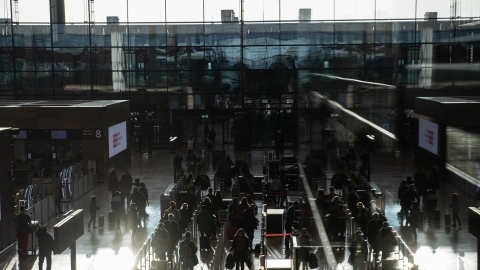While working via Zoom in February, Brett Williams, 33, a lawyer in Orlando, California, suddenly realized his life was "sitting 10 hours a day feeling miserable."
"What do I have to lose? We could all die tomorrow," he thought, and the very next day he decided to resign, leaving behind his lucrative salary to take a job at a smaller company with the goal of having more time for his wife and dog. "I'm still a lawyer. But I'm no longer enthusiastic enough to work day and night," he said.

Exhausted from work and with ample savings, many young people are leaving stable jobs to seek adventure after the pandemic.
There's a growing trend among Millennials (those born between 1981 and 1996): after a year glued to their laptops, they're deciding to take a risk. Some are quitting stable jobs to start their own businesses or move to less demanding work. Others are protesting company announcements to return to the office and threatening to quit unless they get a job they want.
Part of the motivation for them to "take the risk" is the availability of vaccines and the increase in their savings from a year of staying at home. This movement, which has formed among American office workers in recent months, is called YOLO (You Only Live Once).
Olivia Messer, a former reporter for The Daily Beast, also quit her job in February after realizing a year dominated by the pandemic had left her exhausted. The 29-year-old reporter moved from Brooklyn to Sarasota near her parents' home. Since then, she has worked as a freelancer as well as pursuing hobbies such as painting and kayaking. She admits the change has helped her "rediscover a fresh creative sense of life."
A recent Microsoft survey revealed that over 40% of workers globally are considering leaving their jobs this year. Blind, a popular anonymity social network among tech professionals, recently found that 49% of its users plan to find a new job.
Christina Wallace, a senior lecturer at Harvard Business School, said: "Everyone has had a year to assess whether this is the life we want. Especially for young people, who are supposed to work hard, pay off their loans, and one day enjoy their lives. A lot of them are asking themselves: What if I want to be happy right now?"

A trend of quitting jobs to enjoy life has emerged among American office workers in recent months.
Worried about a wave of resignations, companies are trying to boost morale and prevent burnout among employees. LinkedIn recently gave most employees a week of paid time off, while Twitter employees are getting an extra day off each month to "recharge." Credit Suisse has given its employees a stipend, while Houlihan Lokey, another Wall Street firm, has covered the entire vacation for most of its staff.
A pay raise and extended vacation time might persuade some employees to stay. But for others, stagnation is the problem, and the only solution is to leave.
"It felt like I'd been stuck in this career for the past decade, and this was an opportunity for a change," said Nate Moseley, 29, an employee at a large clothing retailer. He recently quit his $130,000-a-year job.
He compiled a list titled "The Late 20s Crisis," outlining his next steps: taking a programming class, mining Ethereum, joining a political campaign in 2022, moving to the Caribbean, and starting a travel company. He regularly reviews and adds new pros and cons to each option. "The idea of going back to pre-Covid settings doesn't seem very appealing after a year has passed. If not now, then when will I be able to do this?" he says.

For some people, stagnation is the problem, and the only solution is to break free.
Some of these people may return to work if their savings run out or their startup fails, but the risk-taking spirit seems to be spreading. In part, that's because there's more risk-taking than ever before.
Covid-19 relief, increased unemployment benefits, and a booming stock market have given more workers opportunities to earn money. Many sectors are now facing severe labor shortages, meaning workers can easily find new jobs if they need them. The pandemic has also created more jobs in more remote areas. "Over the next 18 to 48 months, employees are more in the negotiating position with employers than ever before. Personally, if I'm unhappy with my current employment situation, I'll have plenty of options," said Jonathan Nightingale, an author and co-founder of Raw Signal Group, a management training company.

For some, a long vacation or a more flexible work week might stifle their desire for adventure.
Of course, not every burned-out employee will quit. For some, an extended vacation or a more flexible work week might extinguish their desire for adventure. Others prefer returning to the office for work-life balance.
An unnamed executive at a major tech company said she and her husband had been discussing quitting their jobs in recent weeks. The pandemic had taught them that they had been too cautious with their life choices and missed out on precious time with their family.
Before ending the conversation, she shared a quote from the Buddha about impermanence and the value of realizing that nothing lasts forever. Or, to put it more simply, YOLO - Life is lived only once.

 VI
VI EN
EN


































